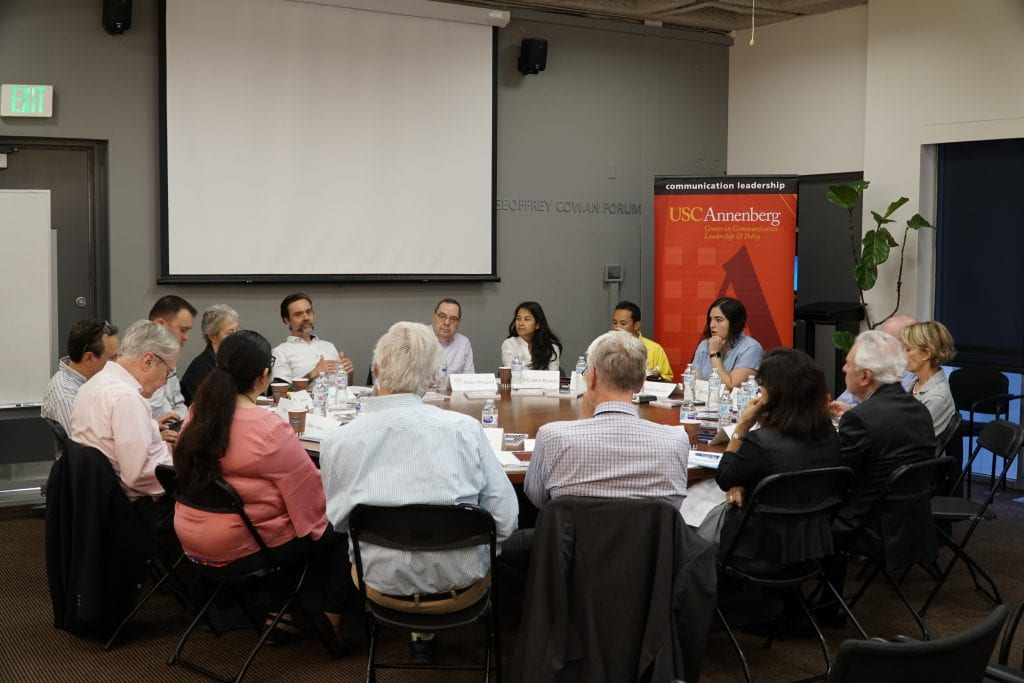In the two years that have elapsed since the election of President Donald Trump, national political discourse has centered on the divisions in American society — particularly the apparent split between urban, coastal progressives and inland, rural conservatives. But over the course of five years, traveling to numerous towns across the United States, authors James and Deborah Fallows honed in on a different vision of America — one where development, leadership and collaboration were quietly taking place, out of the view of the mainstream media.
On Oct. 9 and 10, the USC Annenberg Center on Communication Leadership and Policy partnered with two of its Senior Fellows, Morley Winograd and Peter Hirshberg, to bring the Fallowses together with more than a dozen civic leaders, entrepreneurs, journalists and academics to discuss how to apply the lessons from the couple’s new book, Our Towns: A 100,000-Mile Journey Into the Heart of America, to communities across the country. The two senior fellows drew on their previous experiences to put the panel together; Winograd co-authored Healing American Democracy: Going Local as a response to increasing divisions in American society, while Hirshberg wrote the urban economic development guide Maker City: A Practical Guide to Reinventing Our Cities.
The goal of the session was to come up with a cohesive policy memo that political candidates, nonprofit organizations and local governments could use in crafting solutions to common local issues, from increasing political participation to funding public transportation projects.
To this end, CCLP hosted a dinner on Oct. 9 and a workshop on Oct. 10 focusing on the concept of “localism” — the idea that policymakers and influencers should look to local development as a solution to national policy dilemmas. At the workshop, CCLP Senior Fellow Peter Hirshberg explained that localism could be seen, at its core, as the only route to progress while national discourse and legislative process remain gridlocked and trust in federal institutions has evaporated.
“We’re all at a moment when there’s less trust in national institutions — Facebook, the Church, the federal government — and increasing interest in local things getting stuff done,” Hirshberg said.
 Attendees came to the workshop with different goals — Elizabeth Reynoso of public policy collaborative Living Cities said she wanted ideas for how to leverage the power of storytelling to close racial gaps, while former Assistant Secretary of Labor Doug Ross aimed to find out whether a restructuring of federal authority was necessary to make localism effective.
Attendees came to the workshop with different goals — Elizabeth Reynoso of public policy collaborative Living Cities said she wanted ideas for how to leverage the power of storytelling to close racial gaps, while former Assistant Secretary of Labor Doug Ross aimed to find out whether a restructuring of federal authority was necessary to make localism effective.
Each person was able to share the work they have done locally; Alex Beltran of San Bernardino Generation Now described her work expanding education and economic development in California’s Inland Empire, while Los Angeles Trade Technical College President Larry Frank brought in his experience creating an accessible form of public higher education.
A major topic of discussion was how towns in the parts of the U.S. that are often overlooked in the national discourse can mobilize their populations by changing their messaging to create a sense of pride. James Fallows brought in the example of Charleston, S.C., which is trying to challenge the stereotypes about “hillbilly” culture that are all that many people associate with this region of the U.S.
“Often that involves taking what is a negative self image and making that a motivating force,” James Fallows said. “We were impressed by the power of civic image and self-narrative. It can be a disabling thing, but when switched, it can be powerful.”
Other ideas discussed included increasing access to local media, incorporating technology into civic governance and putting more investment into public spaces. Drawing from the day’s discussion, Senior Fellows Morley and Peter are working with CCLP Director Geoffrey Cowan to write a manifesto that describes short- and long-term goals for both small and large cities, as well as practical ways to achieve them. CCLP aims to distribute the document to municipalities across the country as well as potentially sending it to the Conference of Mayors and the League of Cities.
